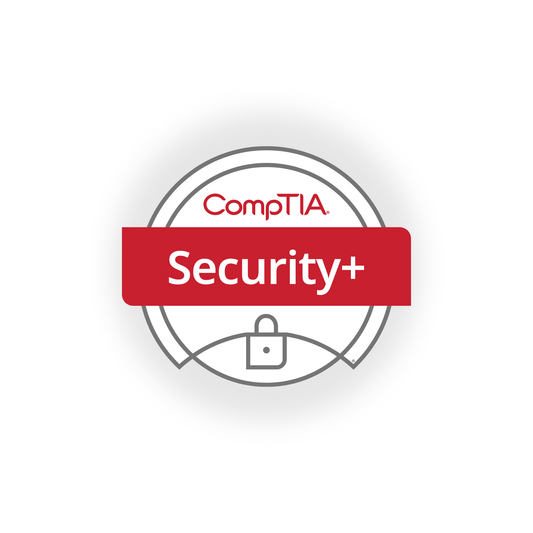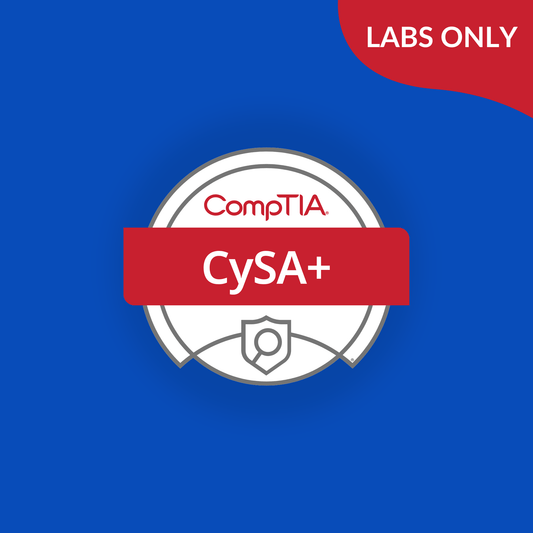Cyber Security Analyst Training
Cyber security analyst training is one of the most direct ways to prepare for a job in the cyber security field. These training programs equip individuals with the skills and tools necessary to identify threats, investigate incidents, and safeguard digital systems against attacks. Whether you are new to IT or looking to move into a more security-focused role, the proper training helps bridge the gap between interest and real-world capability.
-
 $42.50 OFF
$42.50 OFFCompTIA Security+ Voucher (USD)
Vendor:CompTIARegular price From $382.50 USDRegular priceUnit price / per$425.00 USDSale price From $382.50 USD$0 OFF -
CompTIA Security+ (SY0-701) Complete Course, Labs, & Practice Exams
Vendor:CompTIARegular price $349.00 USDRegular priceUnit price / per$0.00 USDSale price $349.00 USD -
CompTIA Cybersecurity Analyst (CySA+ CS0-003) Lab
Vendor:CompTIARegular price $99.00 USDRegular priceUnit price / per -
CompTIA CySA+ (CS0-003) Complete Course, Labs, & Practice Exams
Vendor:CompTIARegular price $399.00 USDRegular priceUnit price / per$0.00 USDSale price $399.00 USD
Why cyber security analyst training matters
Cyber security is no longer a niche skill set. It is a priority for every organization that depends on digital systems. Cyber security analysts play a critical role in helping businesses stay ahead of attacks by monitoring threats, analyzing data, and responding to incidents. But to do that well, you need proper training.
Training builds more than just technical knowledge. It teaches you how to think like an analyst. You learn how to spot patterns, investigate problems, and understand the broader context of how threats emerge. Without a structured program, it is easy to miss essential concepts that are required in real-world situations.
For those starting a new career or looking to make a shift within IT, training gives you a clear path forward. It helps you go from learning on your own to gaining the skills employers actually look for.
What you will learn in a typical training program
A solid cyber security analyst training program teaches more than just tools. It provides a foundation in how systems work, what threats appear like, and how to respond when something goes wrong. You will learn how to monitor networks, analyze logs, and identify vulnerabilities before they are exploited.
Most programs also cover key areas like incident response, risk assessment, security policies, and regulatory compliance. These are not just technical tasks. They are the processes that support a complete security strategy. A good training course will also help you understand the role analysts play within a security team and how to work with other departments.
If the program prepares you for certifications, it will also include practice questions, exam tips, and real-world scenarios that mirror what you are likely to see on the job. This helps you move from theory to practice with more confidence.
How to choose the right cyber security analyst course
Not all training programs are built the same. Choosing the right course means looking at more than just the title. The best programs focus on fundamental job skills, not just definitions and memorization. Look for training that covers both the technical side of security and the practical tasks analysts handle every day.
A good course should also include a guided structure. This means lessons that build upon each other, hands-on exercises, and clear explanations of tools such as SIEMs, vulnerability scanners, and firewalls. If a course includes realistic practice exams, that is a strong sign that it will help you pass certification tests and prepare you for what happens on the job.
It is also worth considering who created the course. Experienced instructors who understand the field can explain complex topics in ways that are clear and understandable. Look for reviews, student feedback, and signs that the course stays updated as the field changes.
Choosing the proper training gives you an advantage when applying for jobs and starting your career with a strong foundation.

Online training for cyber security analysts: What to expect
Online training offers the flexibility to learn at your own pace without compromising structure or quality. A well-designed course will walk you through the core skills needed to work as a cyber security analyst, using video lessons, quizzes, lab activities, and practice exams to reinforce learning. You can train from anywhere, review lessons as needed, and progress at your own pace.
Expect to cover topics like threat detection, incident response, log analysis, and risk assessment. You will also get familiar with the tools analysts use every day, such as security monitoring platforms and vulnerability scanners. Many courses include simulations that allow you to practice identifying and responding to potential threats.
If you are just beginning, reviewing what cyber security is can help you understand how an analyst fits into the broader security landscape. From there, online training can guide you into deeper topics with structured lessons designed to build your confidence.
It’s critical for online training to select a course that combines explicit instruction with practical, real-world applications.
Dion Training’s approach to security analyst training
Our training is designed to prepare you for a job, not just a test. Every course we create focuses on practical skills, short and focused lessons, and real-world scenarios that mirror what cyber security analysts deal with on the job. Students consistently tell us that our lessons are easy to follow, well-structured, and help them retain information more effectively.
We are known for our industry-recognized practice exams. These are designed to challenge you in the same way actual certification exams will, so you are not surprised on test day. Our video lessons are broken into roughly 20-minute segments, making it easier to stay focused and build knowledge in manageable steps.
When you train with us, you are not just getting one course. You are receiving a comprehensive system of support designed to help you advance in your career. If you are exploring training options, visit our full catalog of cyber security courses to find the right fit for your goals and current experience level.
Certifications that pair well with training
Training gives you the knowledge, but certifications help prove it to employers. The proper certifications show that you understand the tools, techniques, and decision-making processes that cyber security analysts rely on daily. They also help you stand out in a competitive job market.
For those just starting out, CompTIA Security+ is a strong first step. It covers essential topics like threat types, risk management, and basic incident response. Once you have that foundation, you can move on to certifications like CySA+, which focuses more on analysis, detection, and advanced monitoring.
Each certification builds upon the last and provides a way to measure your progress. The goal is not just to pass exams but to build confidence in applying your knowledge in real situations.
If you are looking to understand the whole learning path or want to build a training plan that aligns with your certification goals, our cyber security training article breaks it down step by step.
How to get started with cyber security analyst training today
Getting started does not require a technical background or a perfect resume. It begins with a decision to build new skills and follow a clear training path. The right program will walk you through the basics, then guide you into advanced topics at a pace that matches your experience and goals.
If you're unsure where to start, consider what you want your first role to look like. Do you want to monitor threats, investigate incidents, or help build security policies? Once you know your direction, you can choose a course that builds those specific skills.
Understanding the difference between cyber resilience vs. cyber security can also help you decide what kind of role fits best. While cyber security focuses on protection and defense, cyber resilience emphasizes long-term response and recovery. Both areas are essential, and training gives you the flexibility to pursue either path.
Your next step is simple. Enroll in a course, start learning, and build the knowledge that will open doors in this fast-growing field.
Read also:
Frequently Asked Questions
Is cyber security analyst training suitable for beginners with no IT background?
Yes. Many training programs are designed to start with the basics, making them accessible to even those without previous experience in technology or networking. A structured course helps bridge the gap quickly by focusing on foundational knowledge first.
Can I complete cyber security analyst training entirely online?
Yes. Online programs often include video lessons, labs, quizzes, and exam prep materials that allow you to train fully from home with a structured path. Many learners find this format more flexible and easier to manage with work or personal responsibilities.
How long does it take to complete a cyber security analyst training course?
Most training programs range from a few weeks to a few months, depending on your schedule and the level of in-depthness of the course. The pace you set will largely depend on how much time you can dedicate each week.
Does cyber security analyst training include hands-on labs?
Many quality programs include hands-on labs or virtual environments where you can safely practice working with security tools and analyzing threats. These labs simulate real-world scenarios to prepare you for the tasks analysts face on the job.
Is this training focused only on passing a certification exam?
Not always. Some training providers, such as Dion Training, focus on both real-world skills and exam preparation, ensuring you are ready for both work and testing. This dual focus provides you with the confidence to tackle practical challenges and earn certifications.
Do I need multiple courses to become a cyber security analyst?
You may need more than one, depending on your current knowledge. Building a career often involves taking courses that focus on different areas, such as networking, incident response, or analysis tools.




